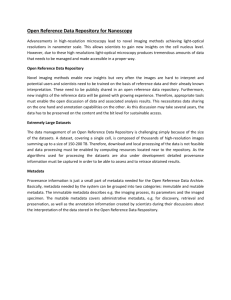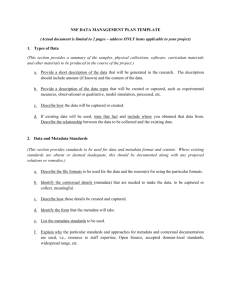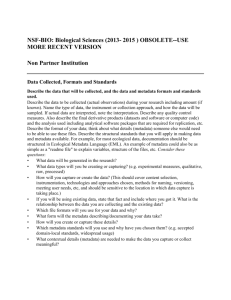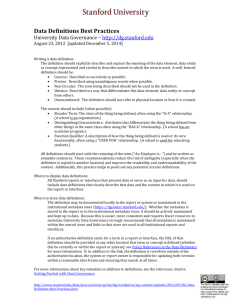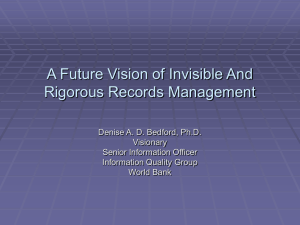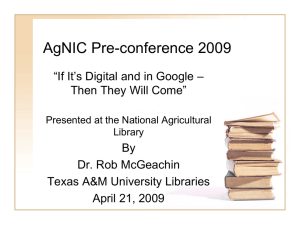NSF Data Management Plan Instructions - Template
advertisement
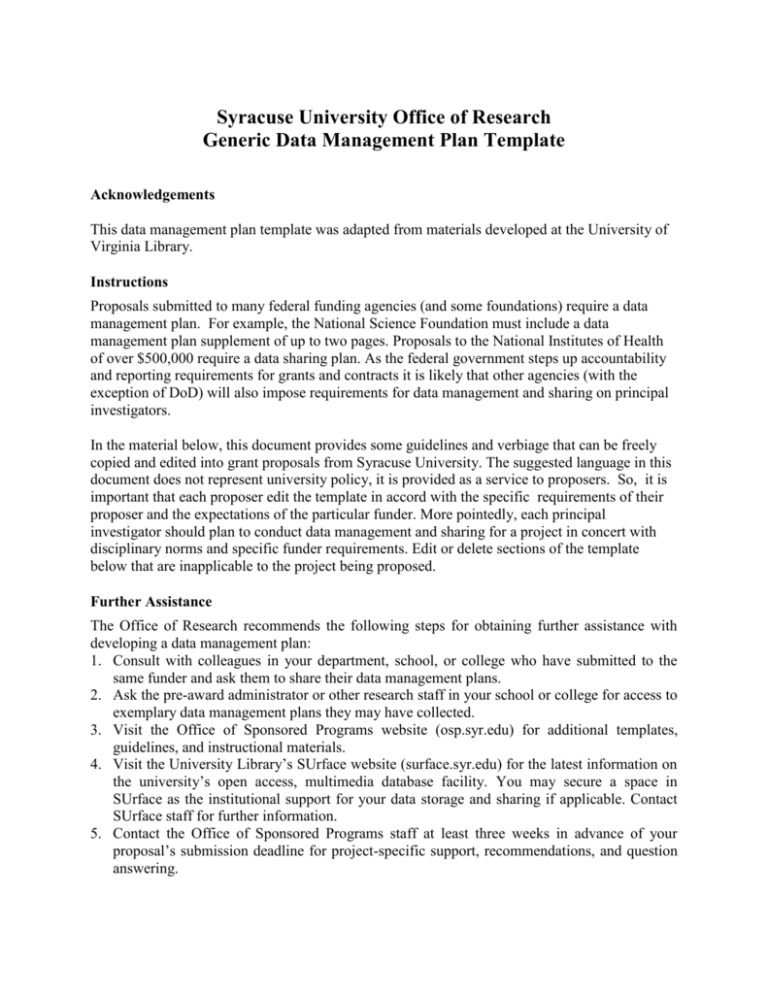
Syracuse University Office of Research Generic Data Management Plan Template Acknowledgements This data management plan template was adapted from materials developed at the University of Virginia Library. Instructions Proposals submitted to many federal funding agencies (and some foundations) require a data management plan. For example, the National Science Foundation must include a data management plan supplement of up to two pages. Proposals to the National Institutes of Health of over $500,000 require a data sharing plan. As the federal government steps up accountability and reporting requirements for grants and contracts it is likely that other agencies (with the exception of DoD) will also impose requirements for data management and sharing on principal investigators. In the material below, this document provides some guidelines and verbiage that can be freely copied and edited into grant proposals from Syracuse University. The suggested language in this document does not represent university policy, it is provided as a service to proposers. So, it is important that each proposer edit the template in accord with the specific requirements of their proposer and the expectations of the particular funder. More pointedly, each principal investigator should plan to conduct data management and sharing for a project in concert with disciplinary norms and specific funder requirements. Edit or delete sections of the template below that are inapplicable to the project being proposed. Further Assistance The Office of Research recommends the following steps for obtaining further assistance with developing a data management plan: 1. Consult with colleagues in your department, school, or college who have submitted to the same funder and ask them to share their data management plans. 2. Ask the pre-award administrator or other research staff in your school or college for access to exemplary data management plans they may have collected. 3. Visit the Office of Sponsored Programs website (osp.syr.edu) for additional templates, guidelines, and instructional materials. 4. Visit the University Library’s SUrface website (surface.syr.edu) for the latest information on the university’s open access, multimedia database facility. You may secure a space in SUrface as the institutional support for your data storage and sharing if applicable. Contact SUrface staff for further information. 5. Contact the Office of Sponsored Programs staff at least three weeks in advance of your proposal’s submission deadline for project-specific support, recommendations, and question answering. Template: Data Management and Sharing Plan Overview. The project described above will produce a variety of data including [raw sensor data sets, statistical data sets, qualitative data sets, video and photographic data, samples, software, collections, curricula]. Data will be captured/elicited/obtained from [describe data sources] and stored during the funded project period in [describe temporary data storage]. We expect the project to generate approximately [X] records [X files] and to require storage of approximately [Y] MB/GB/TB. During the project, these data will be managed by [describe role: e.g., PI, coPI, post doc, GA], who will be responsible for [organizing, tagging, applying metadata, securing, backing up, indexing] the data prior to long term archiving. Data Formats, Storage, and Metadata. During the project, these data will be stored the project data in a [spreadsheet/ statistical program/ database/ cloud service] in a structured format appropriate for managing the data. Syracuse University provides secure storage for these types of data to each faculty member as well as [name of software package] for analysis and display of these data.1 In addition, metadata will be applied to each component of the dataset shortly after initial acquisition of each major data element. In this research area, there [is/is not] an accepted standard for metadata. [Name or describe the metadata standard if one exists.2] Applying metadata during the project will ensure that the data are well prepared for long term archiving at the end of the project. Considered at a high level, the metadata to be applied will capture the responsible person(s), type, format, date, time, storage location, and context of data collection as well as the following metadata elements as appropriate to each data type: [instrument, bitrate, sampling rate, precision, temperature, humidity, geospatial data, descriptive tags, record size, encoding, software version, etc.]. Sharing and Long Term Archiving. During the project, data will be shared only among collaborators from [institution, department] as described earlier in this proposal. At the conclusion of the project, however, that the expectation is these data will be of general interest to the research community. After an embargo period of [X months/years] to allow for primary scholarly dissemination [and/or political reasons, intellectual property protection, licensing, patents, etc.], the project data sets and 1 Note that if your project has needs not accommodated by the typical computing resources available to faculty, you should consult with a representative of ITS and perhaps build in budget items to cover the need for extra storage, features, or software. 2 A list of metadata standards organized by discipline will be available on the iSchool’s eScience project website. The plan will have links from the OSP and library websites. metadata will be submited to [name the discipline specific repository]3 in accord with common practice in this research area. In addition a metadata entry will be made to SUrface for each of the datasets deposited in the [discipline/research community] repository for providing broader access. Note that we [have/have not] included support in the budget of this proposal to account for the time and effort it will take to format and transform the data for submission to the repository. (If possible, it is wise practice to set aside some funds in the budget to support data management practices, perhaps as tasks assigned to project personnel). Once these data sets have been submitted for archiving, the repository will have primary responsibility for long term data curation and access control. Note that this repository [does/does not] charge a fee for subsequent access by the research community. The principal investigators [will/will not] retain the copyright over these data following submission, in accord with the standard terms used by this repository. Privacy/Human Subjects. Because many of the data types collected for this project involve identifiable data about living individuals, we must make special provisions for protecting the rights of these research participants as we plan for long term data archiving. Prior to submission for long term archiving, the data will be deidentified in a manner approved by Syracuse University’s institutional review board to protect the identities of respondents to our study. The consent forms used to enrol participants in this study [will/will not] include a release permission so that identifiable data can be publicly viewed. Note that the following data collected for this project cannot be adequately scrubbed in order to provide sufficient protection, so these data will be destroyed after a period of [X years] following the conclusion of the project: [indicate data types that will not be shared such as raw video, raw audio, genomic data, photographic data, etc.]. Training/Consulting. Given the complexity of data management for this project, we plan to enroll each [graduate assistant, postdoctoral associate, investigator] in an instructional program that will enhance their data management skills. Methodological experts at Syracuse University offer classes and workshops on these topics from time to time. In addition, the budget for this project contains a line item for a data consultant who will assist us at the beginning of the project with software and hardware setup, metadata field definitions, and scientific workflow planning. 3 See osp.syr.edu for a directory of discipline specific data repositories. For example, in social science, quantitative data sets may be submitted to the University of Michigan’s Interuniversity Consortium for Political and Social Research (ICPSR).
